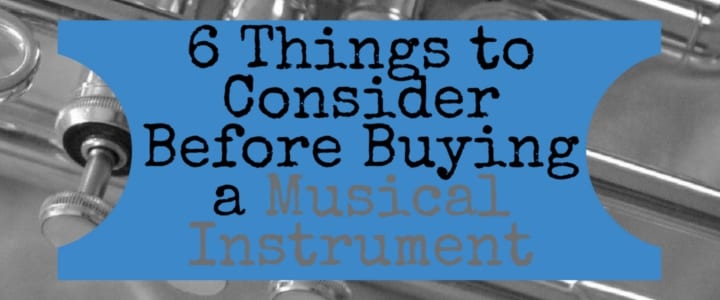Thinking about buying a new instrument? It’s a big decision, as an instrument is truly an investment — especially if you’re spending several hundred dollars (or more, for higher-end brands and models) on it.
Before making your purchase, you’ll want to do some research. But where do you start? With so many brands out there, how do you know which ones are worth the money? What do you really need to ensure years of playing and practicing?
We came across a great article over on Donna Schwartz’s blog that we think hits the nail on the head for what to consider before handing over your cash — whether you’re looking at new or used musical instruments.
Donna writes:
Whether you are a beginner, hobbyist or pro, here are 5 questions to ask yourself when trying out different musical instruments:
- Does the sound of this instrument match my concept of how I want to sound?
- Is the instrument free-blowing enough to allow me to get my “perfect sound”? (Or maybe I want a little resistance on this trumpet to help out with high notes?)
- Is it easy enough to play in all registers of the instrument comfortably?
- Can I control the intonation in all registers of the instrument?
- Are the keys placed in such a way that I can perform rapid passages comfortably?
The above 5 questions are important and vary for every performer. This next question though is absolutely necessary for every musician that wants to perform at their best for a long time.
When you are comparing a few different brands and have found some you really like, before you pull out the credit card, it is crucial to ask this question:
If my instrument breaks, do you have the parts to fix it, and if not, can you get the parts?
Donna continues to point out that an instrument like the saxophone has more than 600 moving parts — so if you end up with an instrument with sub-standard parts that can’t be replaced… you may be out of luck if it breaks. Moral of the story? Do your research. Ask questions. Get help from your music teacher, and have him or her try out instruments with you. Make an informed decision!
You can read the article in full here.
For even more tips, we also like this article from the Tampa Bay Music Academy blog. As part of their steps for buying an instrument, they offer some additional pointers regarding instrument quality:
Instrument quality can generally be assessed using three categories: student quality, intermediate quality, or professional quality.
Your 5th grader doesn’t need a professional quality instrument yet, but should you go the cheap route with a student model or shell out a few more bucks for the intermediate? Ultimately, that depends on your goals for your student.
Is this a “try it and see if you like it” endeavor, or have you and your child committed to this instrument for the long haul? Student quality instruments are usually made of cheaper materials and won’t produce as nice a sound, but they are good for students who don’t know if they will stick with it or not. They’re also good starter instruments if money is tight.
If your child (and you) have committed to playing this instrument throughout middle and high school, however, go ahead and invest in the better quality option if possible.
Continue reading the article here.
And finally, if you’re opting for the used musical instruments route, Get-Tuned.com has a great article on how to evaluate a used instrument.
Readers, how have your experiences been buying new or used instruments? What other tips would you add? Let us know by leaving a comment below!
Image by Vincent Diamante
Suzy S.


